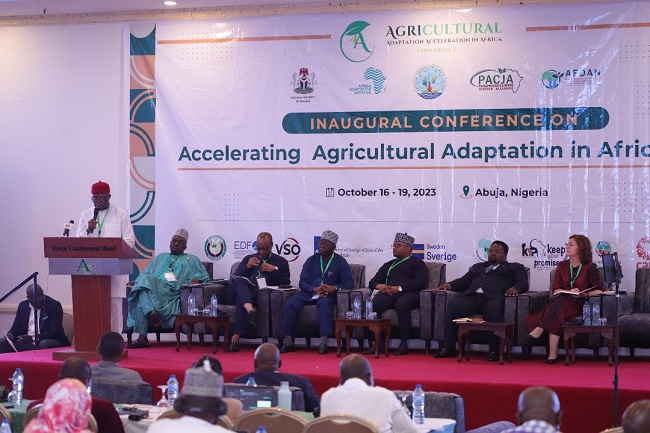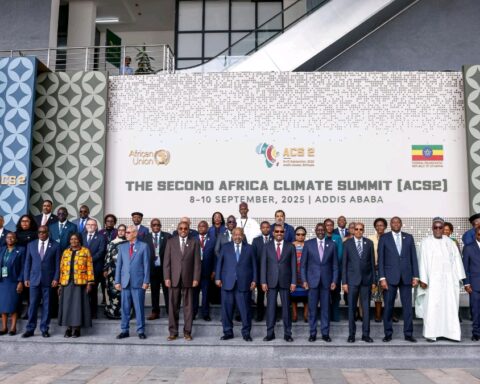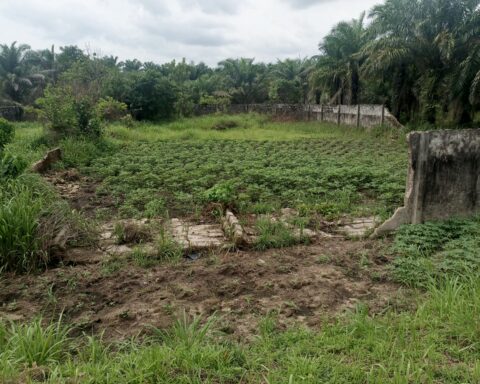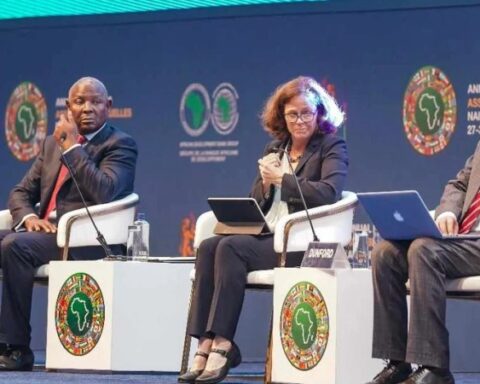Stakeholders including government representatives, policymakers, civil society organizations, and other partners from Africa have convened in Abuja Nigeria’s Capital for the maiden Conference on the Acceleration of Agricultural Adaptation in Africa.
The four-day forum which began on Monday, October 16, 2023, was organized by the Pan African Climate Justice Alliance (PACJA) and the Government of the Federal Republic of Nigeria together with other partners seeks to galvanize a critical mass of actors towards accelerated agricultural adaptation, including stimulating smallholder farmers’ proactive engagement in international climate dialogue and intervention processes.
In his opening remarks the Special Advisor to the Vice President of the Federal Republic of Nigeria Dr. Sadiq Wanka thanked the organisers and reminded them that it takes place at the moment Africa’s agriculture is still depending on rain and while farming communities are plunging into further uncertainty as a result of climate-inspired erratic rainfall and shifting seasons.
He added that Pastoralist communities have lost much of their livestock, including camels, cattle, goats, and sheep to the raging weather events.
“The inaugural conference on accelerating agriculture adaptation is key to galvanizing the critical mass of actors towards accelerated agricultural adaptation, including stimulating smallholder farmers’ proactive engagement in international climate dialogue and intervention processes,” he said.
Director-General of the National Council on Climate Change (NCCC) Dr. Salisu Dahiru, reiterated the importance of the conference as it is expected to be the space for exchange and innovation.
“The importance of this conference cannot be overstated. It stands as a crucial platform where we can unite, share knowledge, and engage in fruitful discussions on strategies and solutions that will pave the way for sustainable agricultural practices in Africa, even in the face of climate adversities. we hope to embark on a journey towards securing the future of food production and ensuring the well-being of our communities,” he said.
Speaking about Accelerating Agricultural Adaptation in Africa, the Director of Climate Change and Green Growth at the Africa Development Bank (AfDB) Prof. Anthony Nyong, said that, to address the social economic and sustainable agenda in agriculture, AfDB set four pillars namely climate smart digital technologies for agriculture and food security; Africa infrastructure resilience accelerator; empowering youth for entrepreneurship and job creation in climate adaptation and resilience; and innovative finance initiatives.
“The African Development Bank recognizes that achieving sustainability in our countries hinges upon the development of crucial sectors, with agriculture emerging as one of the most significant avenues for success,” he said
He said the AfDB estimates that adaptation and resilience costs for the continent will reach up to $30 billion per annum by 2030.
The Senior Natural Resources Management Specialist who represented the World Bank country office in Nigeria Mrs. Drita Dade commended organizers of the conference saying that “inaction in addressing climate challenges not only jeopardizes food security but also heightens susceptibility to extreme weather events, places rural communities’ livelihoods at risk, and intensifies the strain on already stressed natural resources”.
Augustine Njamnshi, chair of Technical and Political Affairs at PACJA, maintained that it’s imperative to think of adaptation but also look beyond the simple concept of adaptation.
“Adaptation in the agriculture sector is an urgent priority for our region. It is a matter of survival, protecting the livelihoods of millions of farmers, ensuring food security for our growing population, and preserving our rich natural resources for generations to come. We must act with a sense of urgency, with a recognition that the time for action is now,” he said.
Rep. Sam Onuigbo, a Parliamentarian and sponsor of the Nigeria Climate Change Act 2021, said that agriculture is one of the pillars of development.
“The north-east itself is an agrarian area, the north-east constitutes one-third of the land mass of the entire nation but we also know that even though agriculture is the mainstay of their economy they are threatened by the devastating effects of climate change,” Onuigbo said.
The Parliamentarian said that climate change has caused drought, desertification, drying up of Lake Chad, and forced migration.
“When people lose their livelihoods, they look elsewhere for their survival. Forced migration which now fuels insecurity and insurgence demands a holistic approach.
“The Northeast Development Commission is not just going to do the reconstruction of buildings, they are also going to handle the physical security and the human security which has to do with the well-being of the people,” Onuigbo assured.
Board Chairman, of Climate and Sustainable Development Network (CSDevnet) Prof. Ibrahim Choji, said that the conference was looking at the effects of climate change which is increasing daily on agriculture.
“Agriculture we all know is the mainstay of Africans where over 70 percent depend on. It is a source of livelihood; it is a source of products for industries on which many depend.
“So, with the increasing threat of climate change to the sector we decided as civil society organizations to come together with stakeholders within Africa to rescue this sector,” he said.
By Dare Akogun








